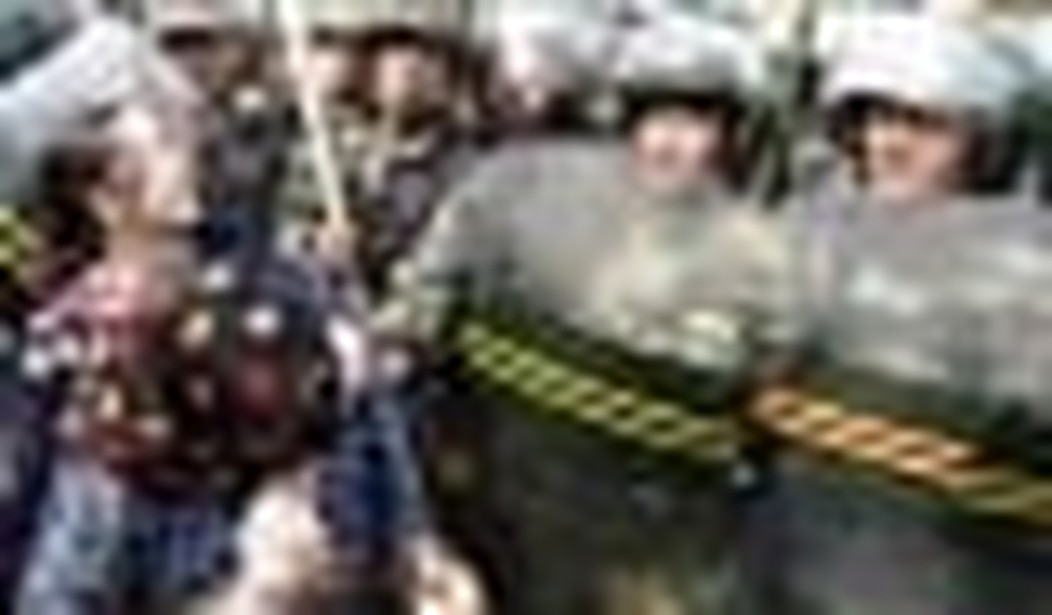On Wednesday, Turkish Prime Minister Tayyip Erdogan announced his country will ask the UN Security Council to discuss the ethnic rioting that has scarred China’s Xinjiang region this week. Then he upped the rhetoric. “The incidents in China are, simply put, a genocide,” Erdogan said on Friday. “There’s no point in interpreting this otherwise.”
On July 5, a peaceful demonstration by the local Uighurs,Turkic Muslims,apparently triggered a savage reaction by Chinese police, and that led to bloody clashes between enraged Uighurs and Hans, members of the majority ethnic group in China. The disturbances started in Urumqi, the capital of Xinjiang,and radiated outward to at least a half dozen cities, especially remote Kashgar.
Of course, Turkey’s request will go nowhere: Beijing wields a veto on the UN’s top body. Turkey, on the other hand, is just a nonpermanent member. Yet if this were not just a matter of power politics, there would be plenty for the Security Council to consider. The Uighurs,unfortunately, are one of the world’s last colonized people.
For hundreds of years, they have tried to free themselves from the rule of Chinese emperors, presidents, and general secretaries. They succeeded in 1944 when they proclaimed the East Turkestan Republic, but the new state did not survive long. Mao Zedong crushed the Uighurs in 1949, the year he established the People’s Republic of China.
As a result of the conquest, Beijing calls the Uighurs “Chinese,” but that’s not true in any meaningful sense of the term. The Han and the Uighurs come from different racial stock, speak different languages, and practice different religions.
The Uighurs, not surprisingly, do not accept the Chinese label, and they reject Chinese rule. Beijing, therefore, has sought to tighten its grip on Xinjiang, which accounts for about a sixth of the total landmass of present-day China. Its most important tactic is to marginalize the Uighurs in their own communities. In the 1940s, the Hans, in fact an amalgamation of ethnic peoples, constituted about five percent of Xinjiang’s population. Today, their number has swelled to about forty percent. In the capital of Urumqi, the scene of most of the recent fighting, more than 70 percent of the residents are Hans.
Han settlers take almost all the good jobs, business opportunities, and positions in the government and Party apparatus. Beijing has continually stripped Xinjiang of its mineral resources and crops. And now the Han are trying to take from the Uighurs their distinct identity. Beijing once thought that economic development would assimilate this minority, but relentless modernization — exploitation, really — has only created resentment. And so have policies that are intended to repress Uighur culture. Uighurs are ordered to shave their beards, not fast at Ramadan, and not pray in public outside mosques. Mosques are tightly controlled, and religious instruction for the young forbidden. Uighur-language instruction has been eliminated. In Kashgar, now known as Kashi, the government has been razing the buildings in the Old City to destroy the remnants of Uighur culture.
And, of course, Beijing employs brute force. The latest official death toll from this week’s disturbances is 184, but that number appears to undercount the dead. Observers say that this is the most deadly series of riots in China since the Tiananmen massacre twenty years ago, but that assessment is questionable. Ethnic fighting flared in Yining, the capital of the short-lived East Turkestan Republic, in early 1997. The unrest is thought to have led to at least several hundred deaths, and subsequent executions added to the toll.
Yet the death of hundreds, and probably thousands, of Uighurs and the systematic destruction of their culture has been met with an eerie silence from Muslim nations. Nations that expressed incandescent rage at the United States due to Abu Ghraib and Guantanamo have, up until now, said nothing about Xinjiang. Why?
Beijing’s hideous practices at home have forced it to engage the governments of Muslim countries. Last decade, Beijing worked hard to create the so-called Shanghai Five grouping, all of whose members bordered Xinjiang. With the addition of Uzbekistan in 2001, the Shanghai Five became the Shanghai Cooperation Organization. From Beijing’s standpoint, one of the primary purposes of the group is to make sure that China’s Uighurs get no support from Central Asia, which also is home to Uighur populations. And in fact, SCO members Kazakhstan, Kyrgyzstan, Tajikistan, and Uzbekistan have closely cooperated with Beijing’s efforts to fight the “three evils” of terrorism, separatism, and extremism. Analysts think of the SCO as the “anti-NATO,” but it can also be characterized as the anti-Uighur organization. In fact, Xinjiang’s Uighurs have received little assistance from China’s Central Asian neighbors.
China’s outreach to Muslim nations goes beyond the Shanghai Cooperation Organization, of course. Chinese diplomats have sought to translate China’s newfound strength into economic relations with Middle Eastern nations, especially Saudi Arabia and Iran. Part of the price for good relations with Beijing has been silence on its policy toward its own Muslims.
Although Beijing’s government-to-government efforts have been successful, China has begun to lose support among Muslim populations. News and shocking video from Urumqi this week has stirred strong emotions. Late this week, the Indonesian Chinese Muslim Association called for Muslims to speak out on Beijing’s brutality, but the greatest reaction has been in Turkey, due to the ethnic bond between the Turks and the Uighurs. There have been demonstrations in Ankara and across the country. A protest in Istanbul on Friday drew thousands. The country’s industry and trade minister called for a boycott of Chinese goods on Thursday, a call that was echoed in the streets.
In the meantime, China opposed any discussion of the violence in Xinjiang in the corridors of the UN. “The Chinese government has taken decisive measures according to the law,” said Qin Gang, a foreign ministry spokesman on Thursday. “This is purely China’s internal affair and doesn’t demand a UN Security Council discussion.” In fact, Fazli Corman, charge d’affaires at the Turkish Mission to the UN, on Thursday denied his country would raise the Xinjiang matter.
It would be no great surprise that the Turkish government backs down on its promise to put Xinjiang on the Security Council agenda, genocide or no genocide. Beijing, after all, is adept at intimidating even the most stalwart governments. Muslim capitals may toe Beijing’s line at this moment, but increasingly less so their people, who can see what is right — and what is wrong.









Join the conversation as a VIP Member